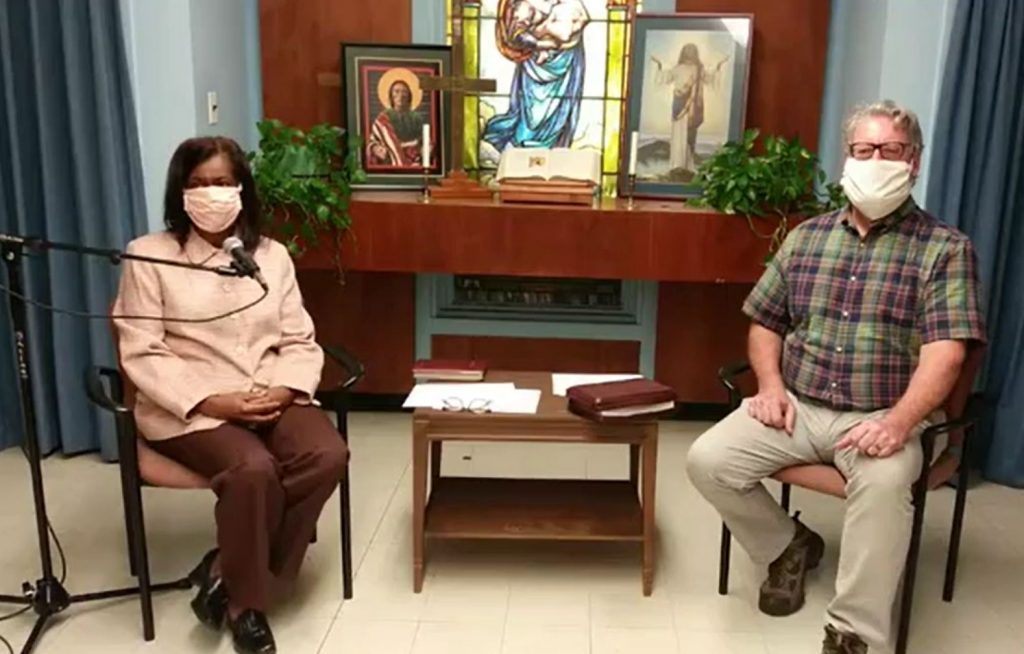In this society, where we are often taught to keep our chins up and move forward toward closure, grappling with the loss of a loved one has become even harder for those who are grieving during social distancing as in-person funerals are not allowed, sharing a meal is often done in solitude and the embrace of someone who cares is absent. Some churches are recognizing this void and are offering their congregations an alternative that is both compassionate and God-filled.
“Our families are now not able to celebrate their loved ones’ lives. A time when our church normally comes together to form a really strong bond of caring has now changed, and this hurts,” said Rev. Joel Hubbard of Park UMC in Bloomfield who said he and his church leaders are planning to do livestreamed memorial services once a month or more for those members who have lost a loved one.
With 21 countries represented at this diverse church, this could be a tall task, but Hubbard said he’s up for the challenge, which comes as no surprise given that once the COVID-19 crisis hit, Park UMC set up its “Food Depot” to feed the hungry in its community. On April 21, they served 80 families, equating to 273 people, many of whom are migrants. In partnership with a local synagogue, Hubbard said, Park UMC also continues to cook meals for the community every Sunday while practicing social distancing.
Hubbard said helping our congregations grieve is just another part of what they do. Families are being asked to send in a two- to three-minute video of memories as well as still photos, if possible. Each monthly memorial service will likely feature this video and photos blended with music from a pianist or organist and a vocalist who will model social distance as well as cutaways to different scenes every two to three minutes.
“We’re hoping that this will provide them with at least a little bit of the solace they need,” Hubbard said.
Also recognizing the need to care for her congregation when they need it most is Rev. Heather Valosin from Denville Community Church who is preparing to offer “virtual memory circles” when needed.
This is conjunction with the congregational care system that was recently formed with 41 volunteers connecting weekly to 430 people with questions about physical, emotional and spiritual health that includes high schools, college students and older adults.
With the same sense of compassion, “the ‘virtual memory circle’ is not a grief group nor a funeral, but rather a hybrid to support people when they can’t physically be together in the midst of grief by remembering and honoring their loved ones,” Valosin said.
From a safe social distance, “virtual memory circles” will work to address Psychologist J. William Worden’s “Four Tasks of Mourning,” which are not linear, nor on a timeline:
- Accept reality of loss and acknowledge feelings
- Process grief and pain through expression, action and ritual
- Adjust to the world without the person who died
- Find a way to maintain a connection to the person who died while reconnecting to your own life.
These “mournings” will last up to an hour, depending on how many people are involved, Valosin added.
Like Hubbard at Park UMC, Valosin said she will connect with families to learn more about their loved one who died so that she can determine how best to honor their memory, which may include music, poetry, guided meditation and/or something else.
Denville church leaders are also considering reflection questions to help facilitate the grief process. Either a song or poem can be contributed by the family or church.
“We also want to make sure they know how to use Zoom,” said Valosin, who added that for larger groups, they will be asked which three people would like to share a favorite memory so they can prepare.
“The time of mourning is complicated, filled with emotions and memories both bitter and sweet. It’s even more complicated in a moment like this one,” Valosin said. “A screen is obviously not the same, but it shows that love doesn’t die, even when people do.”
For Rev. Joe Monahan at Medford UMC, the absence of fellowship has also been difficult, particularly as it relates to funerals.
“You can’t have the process of grief stall out until the pandemic is over,” said Monahan, who along with lay leaders held a memorial service via Zoom for church member, Janet Scheffler who died from complications related to brain cancer on April 1.
Scheffler had been a fixture at Medford UMC, having been involved in Bible studies, stewardship, photography among many other things, so honoring her memory was important for the congregation as well as for her son, Robert.
“It was an amazing time of sharing. It looked like a normal service for the most part,” said Monahan, who added that Broadway music and a rendition of “In the Garden” was incorporated as were moments of sharing from those who joined.
For those wishing to have an online memorial service, Monahan recommended the following: have more than one host, use two devices with audio open on one and record the video on Zoom so that it can be shared with family.
The states of New Jersey, Pennsylvania and New York have issued strict guidelines on funerals that are being updated as the situation around social distancing changes. For the most current guidance on funerals, go to the worship pages on GNJ’s COVID-19 resources.

